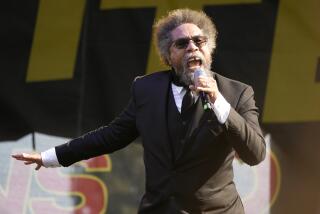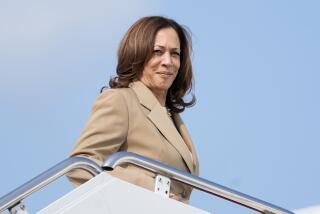Now It’s a War of Maneuver for Top Candidates
- Share via
WASHINGTON — As they head into the flood of March primaries, each of the three major Republican contenders faces a distinct strategic imperative that will rule his efforts to stay afloat in the turbulent waters ahead.
Steve Forbes, the victor in Arizona, needs to demonstrate that his successes there and last week in Delaware were no fluke. To do that, strategists believe, he will have to win elsewhere in the country--particularly in the South, where the modern Republican Party makes its home.
Although Forbes hopes to concentrate his efforts in states like New York and Colorado and in New England, it would be difficult, given the importance of the South to the GOP, for a person to win the nomination without demonstrating at least some strength in the South.
Patrick J. Buchanan, after his disappointing third-place finish in Arizona, must return to his economic message and beat back the Forbes effort to wrest away the mantle of populist champion in which Buchanan has cloaked his candidacy from the very start.
As for Bob Dole, he now confronts the starkest and simplest challenge of all--he must win Saturday in South Carolina or, as his advisors privately concede, he will be engulfed in the contests that flood in after Saturday’s balloting.
Dole faces a particular problem. He has already laid out more than $27 million of the total $37 million that a candidate who takes federal matching funds is allowed to spend in the primaries.
That leaves him precious little room for maneuver, assuming he stays within the legal ceiling. Some campaign officials, however, have already begun to suggest that Dole will do no such thing.
One source familiar with campaign plans even went so far on Wednesday as to suggest that Dole might ignore the limit. The campaign will hit the spending limit “like a speed bump,” go past it and pay whatever fines may be levied later, the source said.
Falling Behind
For all of the major contenders, and those who seem, for now at least, to have fallen out of contention--Lamar Alexander, Sen. Richard G. Lugar and Alan Keyes--the difficulties of getting themselves across to the electorate will be compounded by the cascade of contests that is about to begin. Ten states are packed into six days after Saturday’s South Carolina vote, culminating in the New York primary a week from today. All told, those primaries will yield up 450 delegates--almost half of the 996 needed for nomination.
As outlandish as this front-loading might seem on its face, it has a purpose. Party leaders believe the crowded schedule will almost certainly rule out another eventuality which, from their point of view, would be even more undesirable--a long, drawn-out, indecisive contest culminating in a brokered convention.
Despite speculation to the contrary--and despite the great uncertainty of this increasingly confusing race--most professional political operatives remain fairly certain that the identity of the nominee will become evident before March is over.
Shaping all the strategic calculations is the unprecedented compression of the political calendar, which has endowed the nominating process with a life of its own--creating an artificial universe in which expectations, momentum and the relentless calculus of the ballot box threaten to drown out whatever appeals the candidates try to make to the voters.
Over the next few weeks, the campaign chessboard sprawls from New England across the heart of Dixie to the state of Washington, making the intricately balanced choices the candidates face all the more complex.
Nine states vote next Tuesday alone. As a candidate, do you spend time and money in Massachusetts, with 37 delegates, and Connecticut, with 27, and skimp on Georgia--the largest state of the nine, with its 42 delegates?
And this is not even to mention New York, with 102 delegates--the second-largest delegation to August’s GOP convention behind California, which holds its primary March 26. Because of New York’s arcane election laws, only Forbes and Dole are on the ballot in each of the state’s 31 districts. But how much of their resources can they afford to invest in a contest that falls only two days after the Georgia and New England voting?
As for Buchanan, he must decide whether the prestige of New York is valuable enough for him to make a commitment there although he has delegates slated in only 13 districts.
Money may be a problem for Buchanan. Though he has made much of the economy and efficiency of his guerrilla-type campaign operation, the shift to multi-state competitions and to bigger states makes it harder for him to compete in advertising.
The $300,000 Buchanan plans to invest in South Carolina television gives him an effective voice in that crucial state, but spending on that scale would have little impact in Georgia or New York.
As for Forbes, because he is not taking federal funds, he faces no spending limits other than whatever damage Dole can cause by his repeated charge that Forbes is trying to “buy this election.”
So far, Forbes’ spending seems to show no signs of slowing down.
In a bullish mood after the results were tallied in Arizona, Forbes made his own road to the nomination sound almost easy, insisting in broadcast interviews aimed at voters in the next key states that he could win the nomination on the power of his message.
But Forbes’ job is not going to be easy, not if Buchanan and his belligerent brigades have anything to say about it. In Arizona, Buchanan, made cocky by his New Hampshire victory, predicted he would win. Instead, Forbes ate Buchanan’s lunch. Now Buchanan aides are gunning for their new rival.
In Arizona, while Buchanan fulminated against the establishment and got himself pictured toting shotguns and donning Western headgear, Forbes captured many of the voters Buchanan had counted on getting--those worried about the economy and those who had supported Ross Perot in 1992.
Buchanan and his aides grumbled long and loud about the $4 million Forbes had spent in Arizona, claiming he had created an illusion about himself. “I think Steven Forbes is a largely undefined character in the public mind,” said Terry Jeffrey, Buchanan’s campaign manager. And Jeffrey made it clear that Buchanan was ready to take on the task of defining his rival.
Buchanan was prepared to run as the populist candidate against the establishment candidate, whether it be Dole or Forbes, Jeffrey said. But Forbes, by running as if he were a populist, not a son of the establishment, was not playing fair, Jeffrey complained, indicating that Buchanan would soon put a stop to that.
Silver Linings
Meanwhile, in the Dole campaign, silver linings gleamed amid the clouds of recent defeats. Not only has Dole now won two primaries this week--North and South Dakota--but he has had the pleasure of seeing Buchanan weakened by finishing third. That result reduced the chance of Buchanan’s defeating Dole this weekend in South Carolina.
As a result, Dole aides are now beginning to talk hopefully about turning around what has been a disastrous several weeks.
“You have to choose a place to make your stand and change the tone of the campaign,” said Don Sipple, the consultant who emerged as an important new voice in Dole’s campaign following a staff shake-up earlier this week.
“Frankly,” he said, “we have to start winning and then start inching our way back.”
* FOCUS ON NEW YORK: Forbes plans ad blitz. A11
* RELATED STORY: A5
More to Read
Get the L.A. Times Politics newsletter
Deeply reported insights into legislation, politics and policy from Sacramento, Washington and beyond. In your inbox twice per week.
You may occasionally receive promotional content from the Los Angeles Times.










